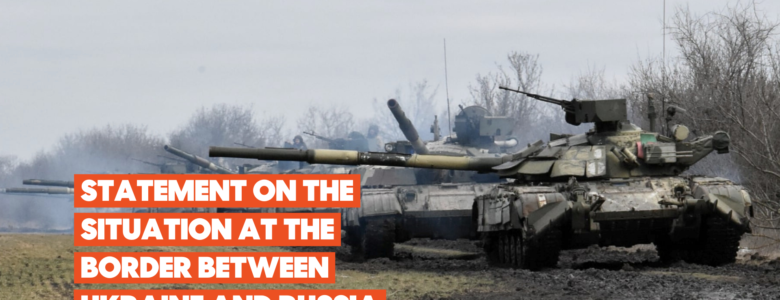
Stop the Warmongering in Eastern Europe
This statement was published on January 18, 2022. Read our statement following the Russian invasion of Ukraine here.
A movement championing transnational democracy can only ever be against imperialism, war and violence: the greatest enemies of our values and the world we seek to build.
The rapid buildup of military equipment in Ukraine and surrounding regions is alarming. The transfer of Western troops and material to a region with an eight year old conflict – as well as stationing thousands of Russian troops on the Ukrainian border – only serves to embolden warmongers. This in turn leads to further militarisation from all sides that ultimately benefits the military-industrial complex.
We continue to see Western leaders remaining subservient to the United States and its ruling elite. In response, undemocratic regimes delve deeper into authoritarianism, as a means to opposing US dominance, leaving the world stuck in a dangerous theatre of the absurd that each side uses to justify their actions.
While Europe is sacrificed to the appetites of imperialists and NATO is allowed to incorporate an additional fourteen nations since the end of the Cold War, ‘progressive’ voices are markedly silent. We are also witnessing the dysfunction of international systems designed to address matters of ‘peace and international security’, with the United Nations seemingly unable to act beyond the podium.
As DiEM25 we feel compelled to speak out for:
- The resolution of any and all ongoing political conflicts exclusively through peaceful and diplomatic means.
- Putting an end to provocative actions on both sides, be they troop build-ups, delivery of arms, large scale military exercises or continued talks on further expansion of military alliances.
- An end to the further expansion of NATO, with the ultimate goal of making NATO obsolete through the development of a common peace system in Europe and the rest of the world.
- Implementing the Green New Deal for Europe which makes militarised accumulation irrelevant.
- The de-escalation of rhetoric and an end to the warmongering by mainstream media.
The continued investment in the war machine takes us further away from cooperating on the real challenges of our time, such as climate change and global inequality. There is no need for apathy or resignation: there is a way out of conflict and towards a life of peace and cooperation.
This statement was drafted with the help of DiEM25’s Peace and International Thematic Collective.
This statement is co-signed by MERA25 in Greece and in Germany (DiEM25’s political parties).
Photo (c) Reuters
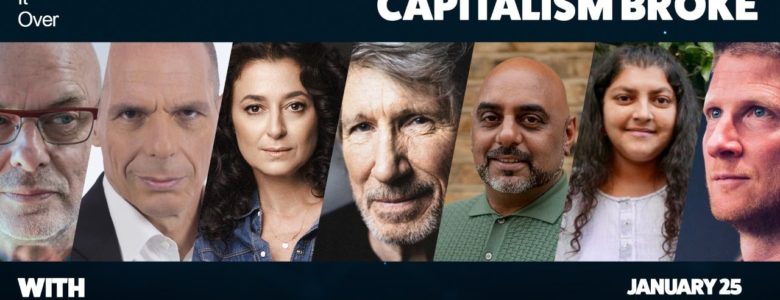
Fixing the Climate Capitalism Broke (Jan 25, 7PM CET) — feat. Yanis Varoufakis, Brian Eno, Ece Temelkuan, Roger Waters and more!
Tonight at 7pm CET
Fixing the Climate Capitalism Broke, with Ece Temelkuran, Roger Waters, Brian Eno, Yanis Varoufakis, Frank Barat, Dipti Bhatnagar (Friends of the Earth) and Asad Rehman (War on Want).
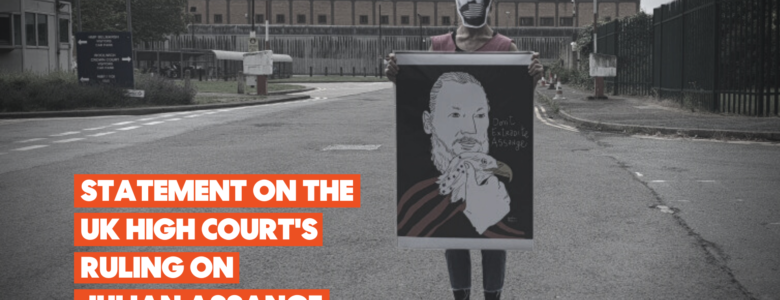
Statement on the UK High Court’s ruling on Julian Assange
We welcome the UK High Court’s decision to allow Julian Assange to appeal his extradition to the US, whose government wants him for revealing its crimes, exposing its lies and informing the public – in other words, invaluable journalistic work.
Today marks a small – but crucial – step in the fight for Julian’s life, and his appeal will now be sent to the UK Supreme Court. Now, more than ever, is the time to raise our voices to prevent what would be an incredibly dark precedent being set for journalists, activists, and all of those who dare confront power. We urge you to join us in that fight.
Help us defend journalists and activists against persecution. Join DiEM25 today and donate to our Whistleblowers’ Protection & Defence Fund.
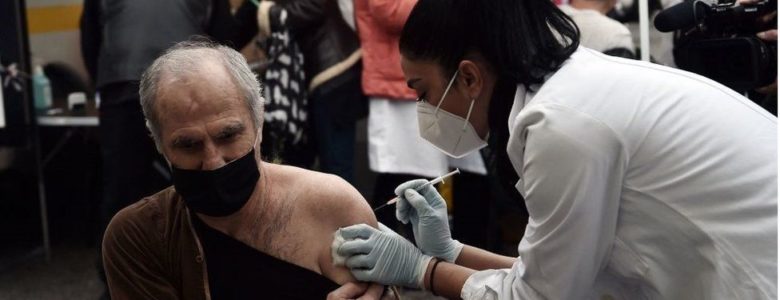
Greek government’s market fundamentalism undermines Greece’s vaccination drive
As of today, unvaccinated older Greeks (60+) will forfeit 100 euros each month.
Market fundamentalism is pushing the Mitsotakis government to adopt a measure that undermines its own vaccination drive.
Yet another example of how the neoliberal mindset fails to understand that the principles of demand and supply do not work when it comes to (uncommodifiable) matters of body and soul. As I explained this morning on the BBC World Service.
Listen below:
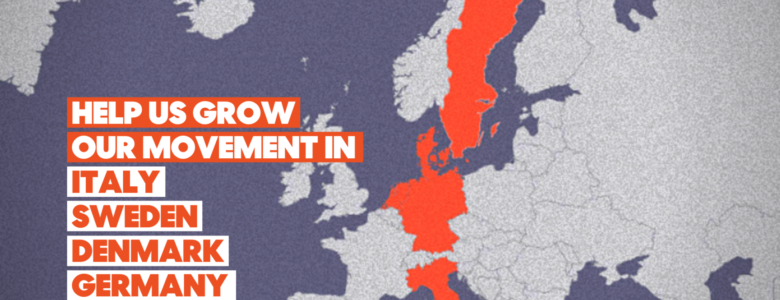
DiEM25 steps up efforts in Germany, Italy, the Netherlands, Denmark, and Sweden
We continue to work hard to scale-up our pan-European struggle.
Next month myself and other members of DiEM25’s Coordinating Collective will be visiting Germany, Italy, the Netherlands, Denmark and Sweden.
Our aim? To help DiEMers organise locally, expand our membership in their countries and coordinate internationally. This local work on the ground is critical for DiEM25 to have serious impact, directly on the lives of the people who need our movement the most.
As a bottom-up, internationalist movement, we’re counting on grassroots support to power our bid to transform Europe.
So, if you happen to live in North Rhine Westphalia, Rome, Utrecht, Copenhagen, Malmö, Lund, Gothenburg or Stockholm and would like to join our organising meetings next month, please get in touch with me here.
Here are the dates and locations of our meetings (time and location TBC):
- Netherlands (Utrecht, The Hague): January 17-19
- Germany (North Rhine Westphalia): Within February
- Italy (Rome): February 5-6
- Denmark (Copenhagen): February 7
- Sweden:
- Malmo/Lund: February 8
- Gothenburg: February 9
- Stockholm: February 10
Also, DiEMer, with your help, over the next few months we’ll be visiting these and other countries to help organise and build the momentum needed to have a bigger impact everywhere in Europe. Will you donate to strengthen DiEM25’s work on the ground?
At DiEM25 we know we cannot wait for Brussels or our national governments to create the change we need. We understand that real change always begins at the grassroots level when people stand together to fight injustice.
And we are proud to be 100% grassroots-funded. Your contributions help fuel the work that is required to make this happen. Please donate today!

The Establishment doesn’t tell us to ‘Look Down’ — it tells us ‘Don’t Look Up’
Recently many people have been talking about the film Don’t Look Up by director Adam McKay. Have you watched it or heard about it? McKay is great because he is able to present important social issues in an accessible and funny way.
In The Big Short, one of his previous films, McKay explains how the 2008 financial crisis started. And later in VICE, he explores how and why western countries started wars in the Middle East over the past 20 years, and more.
Don’t Look Up has become a successful movie because people are identifying with it. Many problems that we face in our day-to-day are being problematised by it. Namely the disproportion between political power held by capitalist corporations — and the people. Capitalist elites play a game of their own making, and make the rules that we have to follow. Their influence on politics means they control decisions that impact their wealth. And people’s lives.
Today experts and the mainstream media make sure we do not understand these problems. Thus guaranteeing that nothing changes. Whereas the film reveals exactly how the mainstream media and experts conceal existing problems.
McKay seems to have learned that capitalist problems are not isolated events. Nor a representation of the corruption or malevolence of singular individuals. So, those problems must exist for the capitalist elite to remain in power.
The exploitation of people and the planet is necessary to sustain capitalism. But to address these issues we must go beyond capitalism as a way to organise our societies.
For as long as the means of producing our lives remains owned by the elite, the people won’t be in charge. They will not be able to organise society themselves (democratically).
The power of ownership ends up dictating how we organise our societies. Historically, profit has never been the main motive for social organisation. It is only with capitalism that society started to put profit (economic value) before and above all other forms of value (social, etc.).
Using the power of the state, the capitalist elite controls all areas of social life. This is in order to secure greater wealth accumulation. And the very people, whom we expect to help the many, such as journalists and intellectuals, become representatives of the elite.
By defending the interests of the elite, experts and the media create a fantasy. A fiction for us to believe in, which they call “reality”. The film, Don’t Look Up, does the opposite as a work of fiction. But because it reveals to us how the power elite works, it ends up more real than our reality. This means that we can use the film to learn about the mechanisms of power that affect our lives.
The capitalist elite does not directly tell us to ‘Look Down’. This is the implicit message. Instead, it tells us ‘Don’t Look Up’. Even though we can feel that something is wrong, we are neither able nor allowed to see it. The essence of our society remains hidden. What is irrelevant must appear as relevant. Our reality has thus become a fiction, it does not seem real anymore.
Information and knowledge can be tools to help us navigate our reality. However, historically, information and knowledge have helped to consolidate specific cultural practices. And to manipulate the populace by the means of propaganda.
The colossal amount of available information may suggest that society is immune to propaganda. But quantity dissolves quality of information.
Left-wing movements must take back the task of the political education of the masses. The lack of understanding of the key messages in Don’t Look Up reveals the depth of the problem. Left movements must emancipate themselves from the grip of the power elite, and start acting on behalf of humanity and the planet. The elites are pushing not only class struggle, but class warfare. And the Left remain believers in the fantasy of governing for all within societies divided into classes.
Before the Left can provide any unveiling of power, it must learn how to connect theory to practice. Because appearance has taken over not only the minds and dreams of the masses but that of Left-wing proponents s well. When names like Lula (Brazil), Boric (Chile), Mujica (Uruguay), come up, the Left start celebrating victory. But they do this without considering the historical practices of those candidates. And the class relations which are particular to each country.
While the Left sleeps, believing that gradual reforms are enough, it forgets that is has become controlled opposition. The Left’s idealist dream for unity with the elite yields a blind acceptance to domination at the expense of the masses. In the abstract name of unity, the precarious conditions of the people become sanctified. Only substituted by new appearances. Concretely, however, nothing changes.
As George Carlin said, when writing about the United States elite:
“The owners of this country know the truth, it’s called the American Dream, because you have to be asleep to believe it”.
Sadly, this applies to most capitalist countries, if not all.
Screenshot taken from the film for illustration purposes
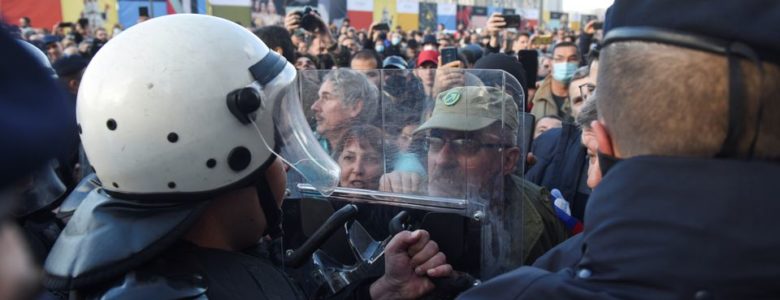
Mining corporations are causing massive damage to communities – but people are fighting back
In November, protestors blocked bridges and roads in the Serbian cities of Belgrade and Novi Sad. They were expressing concern at government plans for new property expropriation, and other laws, which could facilitate transnational mining by Rio Tinto and others. Corporations like Rio Tinto want to extract lithium from mines in Jadar and Radjevina, Western Serbia, worth a total of $2.4 billion.
In Ireland, during the same weekend, demonstrators came together at a gold mine in Tyrone to oppose plans for gold mine prospecting in the north western county of Leitrim.
In recent months, communities in Ulster and other provinces have united in opposition to extractive industries, such as toxic mining for gold and other metals, and have held various protests and demonstrations, including at the Dublin and Belfast Assembly buildings.
This reflects the fact that people in Europe are becoming increasingly aware of the risks posed by extractive industries, particularly their destructive environmental impact to land, air, water and the biodiversity of the planet.
One of the campaigners against gold mining by a Canadian company at the Sperrins in Ulster, who was at the Dublin demonstration in August, said, ‘gold mining is the second most destructive industry in the world, second only to nuclear’.
Activists from another group, Save Inishowen from Gold Mining, who supported the demonstration, have pointed out that ‘large gold mines use 1,900 tonnes of cyanide per year to separate gold from ore – a rice size grain of cyanide can kill a human’. They also refer to an incident in Romania at the Baia Mare mine where a waste dam failure released 2,5 million cubic feet of cyanide contaminated water into the rivers Tisza and Danube.
There is already broad awareness among the European population of the heavy environmental and human costs and misery caused by mostly Canadian registered corporations, making up 75% of the world’s mining companies, in Global South countries such as Papua New Guinea, Ghana, Ecuador and the Philippines. Most recently there was dismay at the news that a section of the Amazon rain forest will be cleared for the Mirador copper mine in Ecuador.
The campaigning group Yes To Life No To Mining (YLNM), who have been campaigning from London and who have support groups in the regions most affected by mining, now express fears that ‘many of the abuses in the Global South are now being replicated in Europe’.
In Europe, from the Western Peripheries of Ireland and Spain through to the Eastern Peripheries of Finland and Serbia, mining operations for the extraction of metals deemed suitable for so-called ‘green’ capitalism are gathering pace in order to maximise profits for private enrichment while disregarding the high risks for environmental destruction and climate catastrophe.
According to Lynda Sullivan of Friends of the Earth (Northern Ireland) twenty-five per cent of the northern six counties, and twenty-seven per cent of the rest of Ireland, have concessions for potential mining which could increase to seventy per cent.
Transnational corporations are manipulating the worries over global warming and climate change to accelerate the process of extractivism and to spread it more widely, including to the Global North. They recognise that the extraction and processing of metals and minerals such as lithium, cobalt, nickel, zinc and rare earth elements must be significantly increased to meet the ‘consumer demands’ they are creating for products like electric cars in the growth for growth sake economy in which they have a huge stake.
It is estimated that the demand for lithium will be fifty times greater by the year 2040. YLNM have explained that eighty-two per cent of mining areas are for metals and minerals for renewables. Germany has become one of the largest importers of this metallic raw material for its large scale automotive industry. The demand for copper to be used in electric vehicles will rise from 208,000 tons in 2017 to 1.91 million tons in 2030 – a nine fold increase in thirteen years.
Sacrifice Zones
On December 6, at an online meeting to oppose extractive operations in Ireland, concerned citizens and community activists heard the American film actor and environmental protection activist Mark Ruffalo say that ‘Ireland should not be a sacrificial zone’. This call for environmental justice so that ‘our homes, lands and waters are not treated as sacrifice zones’ has been echoed by other campaigners. At the ‘No To Toxic Mining’ demonstration in Dublin the rallying cry was ‘Ireland is not for sale!’. And during the Belgrade protests one person attending said ‘I’m angered because we’re an occupied country’.
Both responses signify the upset that communities are starting to feel because of the way that the Serbian and Irish governments seem intent on trading away the good health of people, place and planet to transnational mining corporations. The two governments are declaring that the countries are ‘open for business’ to these mining companies and encouraging them to view community life, as well as land, air and water as sacrifice zones in their pursuit of big profits that will be siphoned out of the country.
European governments, including those in the EU, such as Ireland and those waiting to join, such as Serbia, are operating within an EU framework with its policies of mixing up demand for more mining with action on climate change, and conflating this with social progress. This is based on the belief that increased consumption for its own sake is good and necessary regardless of the negative outcomes and consequences. This is putting them into conflict with communities who are genuinely concerned and seeking solutions to the problems of climate catastrophe, loss of bio-diversity, and environmental destruction.
People are increasingly seeing that economic policies resulting in environmental abuse, and based on the illusion of ever-increasing ‘gross domestic product’ are not the answer. The people mobilising to resist extractive industries must be supported in their ‘Right To Say No’ to the imposition of toxic mining in their communities and environment. This right is enshrined in legally binding Free Prior and Informed Consent (FPIC) protocols, and must be respected.
Pathways to solutions should also be presented as part of this resistance and struggle for rights and justice. This includes the proposals contained in DiEM25’s Green New Deal for Europe (GNDE);
- ‘For all EU institutions to switch from a Gross Domestic Product (GDP) to a Genuine Progress Indicator system of accounting’
- ‘Recognising that environmental destruction is a threat to human and non-human life, introduce an Environmental Abuse Directive to codify the civil wrong for contributing towards climate and environmental damage, with personal and punitive liability for those who profit from pollution’
- ‘Recognise that climate change is criminal damage, and that ecocide is also a crime’
Photo (c) REUTERS/Zorana Jevtic
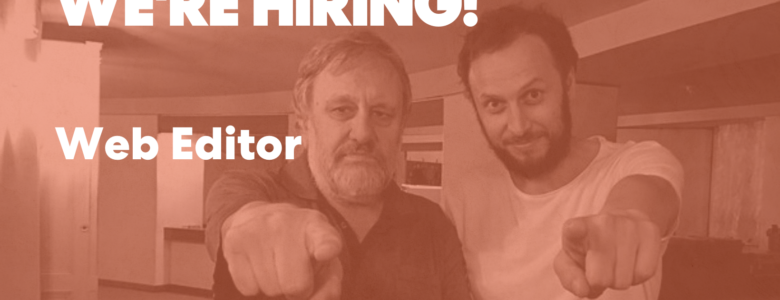
We’re hiring! Web Editor
We are looking for a passionate person to take up the role of Web Editor [part-time, 20 hours per week].
The successful candidate should be a skilled writer and editor with an eye for detail and who will be working closely with our broader communications team.
The deadline for applications is January 31, 2022.
Read the job description and apply!
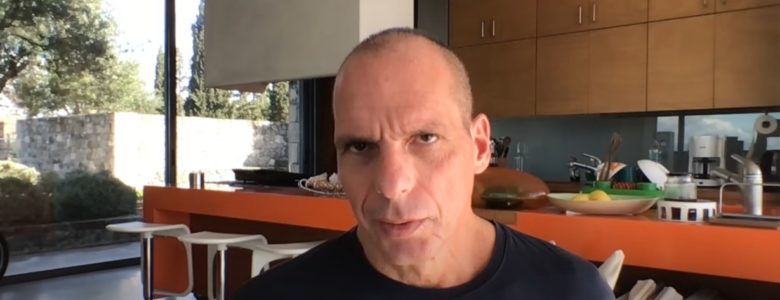
End of year (2021) message from Yanis Varoufakis
As I look at the main events engulfing our lives over the past year, from the widening social and economic divisions resulting from our leaders’ mismanagement of COVID-19 to the worsening of our planet’s health, my message to you is: DiEM25 has never been so relevant – and needed.
So, what’s next? In this video I share some ideas for our movement’s challenging yet exciting road ahead. Build the next phase of DiEM25 with us!
Wishing you and yours peace, health, happiness, and prosperity in the coming New Year.